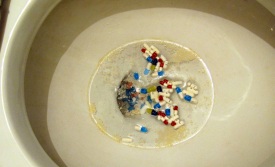To Flush or not to Flush: Disposing of Medicine
This may or may not be news to you, but a lot of people meticulously flush their unused and/or expired medication down the toilet. But recently the practice has come under fire, and the public is being encouraged to dispose of their medicine in other ways. But what way is really the best?
 |
First, some countries actually put disposal instructions on the label or in the instructions that come with the medicine. These instructions provide a "best practice" for that country, and often represent agreements that have been made within that country (and so they are not necessarily helpful outside of the country).
So it’s best to follow those directions if they are available.
First, why would anyone flush their unused medication?
One of the most important reasons is that drugs are simply being taken by people who shouldn’t be taking them. Pets rummaging through the garbage are taking them, children are finding them and taking them, drug addicts are even hunting for them. Worse, some people actually give their prescription medication to a friend or family member who has not been subscribed the same thing.
As you might guess, all this is very dangerous, and an easy way to for the most part avoid the problem is to flush.
Sounds great – so why the outcry against flushing?
Concerns have arisen recently because trace amounts of drug residues have been found in drinking water. Could these drugs that are flushed down the toilet actually end up in a glass of water that a child drinks at bedtime?
So far, the answer seems to be probably not. And for two reasons:
- The "residues" found in drinking water are so minuscule, there’s no evidence that they could have any negative impact on anyone. We’re talking a very very very small amount, not anything close to a dose of medication.
- Did this really come from flushing medication? Maybe, maybe not. Much of it probably came from other things that normally end up in the toilet. That’s right, even after you take the medication, some of it is likely to still end up coming out again.
Further, if we make drug disposal too complicated, it just won’t happen, and then we end up with a worse scenario.
Still, why not be on the safe side if you can be? There are other methods for disposing of drugs. Here are some suggestions:
- First, follow any instructions on the label.
- Check to see if there is a program for drug disposal in your area. Contact the waste disposal authority in your city or town and ask, or check their website. In the USA, start here. In Canada, start here. For the UK, read here. Australia? Start here.
- Check with your pharmacy to see if you can return the drugs there (not for a refund, of course!).
- If you’re going to throw them in the garbage/trash/rubbish, take them out of the package and mix them with something yucky (how about kitty litter? mmmmm). Then seal them in a seal-able bag, and dispose.
- If flushing, again, remove the medication from the package. In the USA, the FDA suggests that specific drugs be flushed (the list can be found here). However, check for other options first.
In the end, remember to go through your medicine once a year to get rid of what you don’t need or whatever is expired. Include non-prescription medicine and even herbs and other supplements in your search. And dispose safely.
Lots of useful information (especially for the US) on this site. Thanks for the reminder from How To Cope With Pain.
